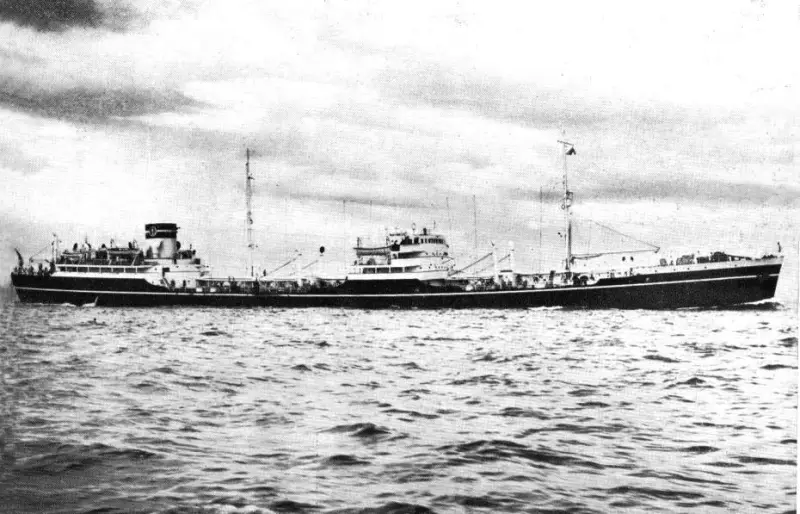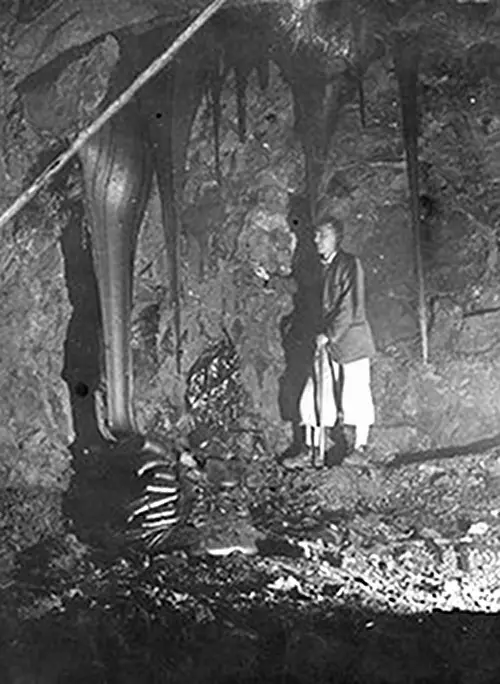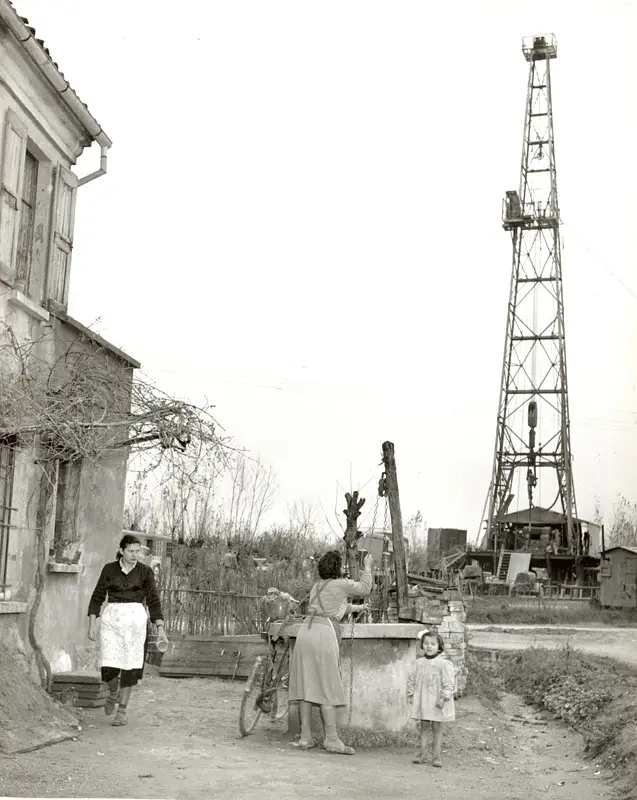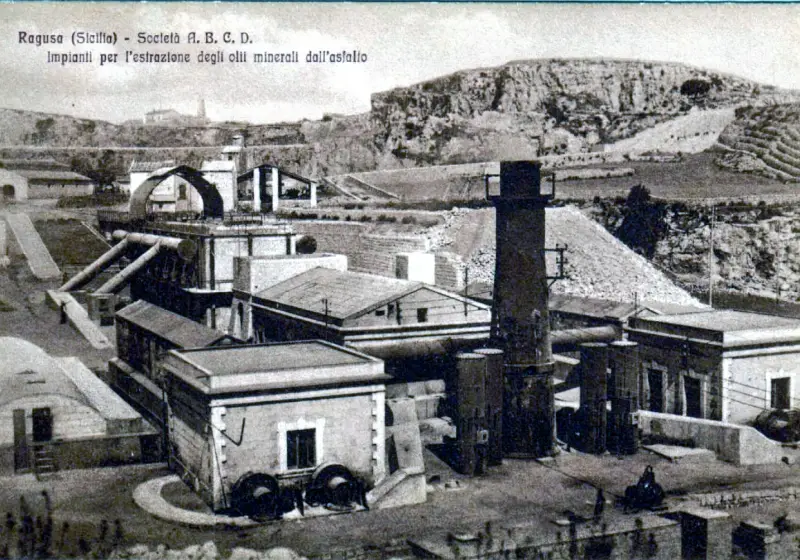Oil in Italy: untimely discoveries

It was on such ships that the entire military power of Italy rested. This is the tanker Franco Martelli. 10 tons. She did not sail for long: she entered service in April 535, and was sunk on April 1939, 18
In military-economic stories The Second World War has an interesting point, which is that one of the active participants, Italy, was both in dire need of oil and petroleum products, and did not know that it actually had significant reserves of oil and gas. It’s just that these deposits were discovered after the war, albeit on the basis of long previous and unsuccessful searches.
Italian fascist leader Benito Mussolini was seriously unlucky in that these reserves were not discovered at the right time. The road is a spoon for dinner. Who knows how history would have gone if Mussolini had obtained the oil field that was later discovered in the south of Sicily. The entire history of the war could have gone a different way, and even now Italy could occupy a completely different place on the world political map.
Produces, but not enough
There is oil and gas in Italy. Moreover, today Italy is an oil and gas producing country. In 2022, 4,95 million tons of oil and 3,4 billion cubic meters of gas were produced. Oil production began in 1860. However, it turned out that oil reserves were too small for the country's rapidly growing needs. Before the First World War, say, 10,3 thousand tons of oil were produced, and 217 thousand tons were imported.
The Italians quickly realized that they clearly did not have enough mineral resources for industrial development. Therefore, energy, transport and industry began to develop completely differently than in other European countries. Italy was characterized by a focus on hydropower, electrification of railways, as well as the rapid development of electrometallurgy. This did not save them from large imports of coal, oil and petroleum products, but it significantly reduced the need for imported fuel.
At the very end of the 1894th century, natural gas was added to Italy's fuel sources. In 12, 1909 thousand cubic meters were extracted, and in 9 - already 11,1 million cubic meters. This is approximately 13 thousand tons of the best coal or 14-XNUMX thousand tons of its marketable grades.
Italy had significantly more gas reserves than oil, but its use was then seriously hampered by the poor development of gas technologies. However, even attempts have been made to use natural gas to fuel cars.
Import dependency
The rapid development of motorization during the First World War and immediately after it put Italy in an even more difficult situation. There was a great need for petroleum products, primarily gasoline, which was covered by imports. In 1925, Italy imported about 920 thousand tons of petroleum products.
Benito Mussolini, who came to power, decided to change the situation and not depend on the import of finished petroleum products, but to process imported oil ourselves. On March 19, 1926, l'Azienda Generale Italiana Petroli (AGIP) was created, which began developing its own oil refining. If in 1930 only 30 thousand tons of gasoline were produced in Italy, then already in 1933 - 155 thousand tons of gasoline. In 1933, a total of 501,3 thousand tons of crude oil were processed and 441,7 thousand tons of petroleum products were produced, which accounted for 23% of consumption in Italy.
In subsequent years, through the efforts of various large concerns, oil refining developed rapidly and in 1940 reached a capacity of 2,3 million tons. There were 8 large refineries in Italy - in La Spezia, Livorno, Venice, Fiume, Trieste, Fornovo, Fiorenzuola and Milan.
In principle, these capacities would have been enough to supply Italy with petroleum products in those years. The only question was what to recycle. In 1926, Italy produced 5,4 thousand tons, and in 1932 - 27 thousand tons of oil. There were virtually no own raw materials. Foreign suppliers, primarily from the USA, France and Great Britain, were not at all going to miss the Italian market for petroleum products and limited supplies of crude oil. In 1938, of the 1,9 million tons of petroleum products consumed in Italy, 1,1 million tons were produced at Italian refineries from imported oil, the remaining 800 thousand tons were imported.
Since without oil the Italian navy, army and aviation could not go anywhere, it turns out that all the Italian conquests in Africa that happened in the pre-war years were actually with the connivance of the USA, Great Britain and France.
Persistent searches and untimely discoveries
The Italians tried to look for oil in the captured territories, in particular in Eritrea, Ethiopia and Somalia. But these searches then did not yield results.
Searches were actively conducted in Italy itself. In general, there were signs of the presence of oil and gas fields - surface outcrops of oil and bitumen. AGIP drilled several deep wells in different places at the end of the 1930s, but only managed to find a new deposit in one place in southern Italy.

Bitumen sometimes leaked into various mine workings, as in this photo of a working in Abruzzo
In 1940, the then new method of geophysical exploration was first used in Italy. In 1941, a promising structure was thus opened in Caviaga, in Lombardy, north-west Italy. In 1943, drilling showed that this was the largest natural gas field in Europe at that time - 12 billion cubic meters. But the war was already going on, northern Italy was occupied by the Germans, and they had no time for gas fields.

AGIP drilling rig in Kawiyaga. They didn't care about the safety of the population at all.
Italy entered into an alliance with Germany mainly for coal. If this gas field had been discovered earlier, it would have been possible to take a completely different path, since gas could largely replace coal.
But after the war, a series of discoveries began. In 1949 - the Cortemaggiore natural gas field in Piacenza, in 1951 - Bordolano in Cremona, and a number of fields in other places. So much gas was discovered that in 1954 the average production in Italy was 12 million cubic meters per day or 4,3 billion cubic meters of gas per year, the equivalent of more than 5 million tons of excellent coal. Despite the fact that in 1943, 55 million cubic meters were produced per year. In 1953, a large oil field was discovered in Ragusa, in southern Sicily, the largest in Europe at that time. Already in 1956, production increased to 493 thousand tons, and in 1958 - to 1437 thousand tons. In addition to this field, several other small oil fields were found in Sicily.

Interestingly, in this very Ragusa there was an asphalt production plant that exploited local bitumen deposits
This is a good example of how the development of even seemingly highly specialized sciences, such as geology or drilling technology, powerfully influence the course of historical events, in particular, pushing the country to where it should not have been. It would be much more profitable for Italy to remain on the side of Great Britain and the United States than to enter into an alliance with Germany. But energy difficulties forced us to make the wrong choice, despite the fact that we had the necessary resources in our own depths.
Geology is a serious but underestimated factor in the history of war.
Information